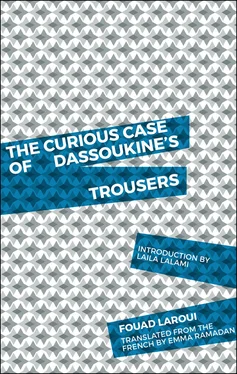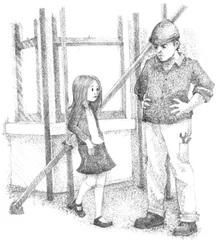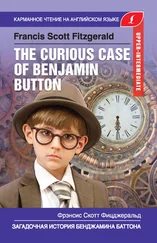“Who? Zerhouni?”
“…finds the solution: call in a specialist of fluid mechanics. Abdeljebbar, his nephew, was an engineer who graduated from the École Mohammedia for engineers and, as such, knew the Navier-Stokes equations, which determine, as you are aware, fluid mechanics. They called in Abdeljebbar, who lived five minutes away. He came. Was informed of the problem. Squinted his eyes. Pouted. Took a notebook out of his pocket. Etched a few very elegant curves. And decided thus: the results obtained for swimming on sand must be multiplied by a factor of 1.2 to be compared to those obtained on grass. Still all that depends on the quality of sand and on the ambient hygrometry, but anyway, if we kept track of all the variables and of all the parameters needed to resolve a problem, we would still be in the stone ages.”
“Problem solved.”
“Not quite. The head of the establishment of Lalla Zahra, a certain Zniga, entered the scene. Possessing neither sand nor grass, Zniga proposed adding gravel into the list of water substitutes. It was too late, since everyone had accepted sand, grass, and the coefficient 1.2.”
“Gravel? That’s not a sport anymore, it’s torture.”
“That’s what La Royale unanimously decided: Zniga was denounced. (As an aside: this was perhaps the day that began Zniga’s decline. ‘Denounced by his peers,’ as wrote the local correspondent of Le Matin , he shut himself away in morose silence, which degenerated into a sort of nervous breakdown and he ended up assassinating two attorneys a few years later. But anyway, that’s another story.) So all the high school students of El Jadida began to prepare for this strange swimming test that promised surprises, perhaps even world records — in slowness, naturally, but that’s still something. The day of, everything went well. Diving was out of the question, of course. Some jumped in the sand, others stepped over a small fence and found themselves grasping at grass.”
“Which is better than finding yourself grasping at straws.”
“…they set about swimming diligently and, at the end of the day and taking into account the 1.2 coefficient imposed by Abdeljebbar, everyone had their grade.”
“All’s well that ends well.”
“Almost. For there was the case of Talal. Do you remember Talal? Whom we nicknamed Bouboule, because he was really fat? Talal was a boy with no story, with no collective importance, barely an individual. His mother was invisible, his brothers insignificant, his sisters nonexistent, his cat scared. His father wasn’t much of anything, some kind of clerk in a trial court or something of that sort, or perhaps not, perhaps he only gave off the air of running through court hallways, busy, rushed, jabot utterly askew, like those men who call themselves doctors for twenty years and then one day it comes to light that they can’t read or write. But this clerk, real or illusory, Talal’s father, kept in his wallet a document of the highest importance. Guess what it was, friends?”
“A map of Treasure Island?”
“The blueprint for the atomic bomb?”
“The list?”
“No, you band of donkeys. (What list?) What he guarded preciously in his wallet was a rectangle of a few centimeters in length: a business card. But careful! Not just any business card! It was…”
He withdrew into his chair and subsumed us in a gaze sparkling with commiseration (for we didn’t know).
“It was the business card of the king’s chef!”
General commotion.
“Don’t forget that this story takes place at the beginning of the ’70s. Everything related, closely or distantly, to the Palace made the masses tremble with fear. The man who buttons up Hassan II’s shirt cuffs has more power than a minister. He who shines his boots commands generals. So, his chef! I don’t know how the evanescent clerk procured that business card but he hinted that the king’s head butler was a cousin of his and, as a result, this calling card that he only exhibited on rare occasions conferred on him an infinite prestige. You didn’t mess around with Talal’s father.”
“Precisely, let’s get back to Talal…”
“I’m getting there. So, the young Talal jumps in the sand, spreads out over it like an obese tarantula, swims haphazardly, but — catastrophe! — he faints a few meters from the rope that symbolizes the edge of the pool. Sunburn? Exhaustion? Abulia? No one knows. His classmates, on solid ground, cry out, wave him on, encourage him…Nothing works, he looks like a recumbent marble statue petrified by a gust of wind. Talal lies still. Talal doesn’t move. His professor, a bit of a risk-taker, throws himself into the sand and fishes out the poor boy. There he is in the middle of the playground, awoken by a few vigorous slaps. ‘Where am I, who am I, etc.’. That night, at home, he rests, surrounded by the affection of his invisible mother, of his insignificant brothers, of his nonexistent sisters, and of his cat that scrams, frightened. His father enters and announces to him coldly that he received a zero in the swimming test. General affliction, the ghosts groan, insignificance clenches its fists, the feline redoubles its pusillanimity. But what could be done? Spurred on by his pater (who fondles the business card in his pocket), Talal goes to the high school the next day and drops off a complaint. In essence, it said, conditionals included: ‘If I had taken the swimming test in water, as do civilized people, and not in sand, I would not have washed up flailing on the aforementioned sand and thus would not have failed the test’—which, I mention in passing, was formulated with a rare grammatical accuracy. ‘You would not have washed up, nitwit,’ replied his professor. ‘You would have sunk like a stone and you would be dead.’ And he adds, digressing, as professors often do: ‘By the way, a mammal cannot wash up on sand.’”
Nagib is outraged:
“He’s wrong. Whales wash up on sand. Whales are mammals.”
“No, they’re fish.”
(Thus ensues a pointless discussion, which has taken place in all ages and all latitudes, on what whales are — meanwhile people are dying of hunger (in their case, a whale, conveniently carved up, would be most welcome [but are they halal?]. Victory to Nagib and all of science: cetaceans are mammals. End of digression.)
“Anyway, the affair reaches the head of the establishment. It’s true that Talal had not finished the race…”
“He finished it on the sand,” Nagib intervenes.
“But he had begun it on the sand,” Ali retorts. “At what point do these millions of grains cease to be sand and become a part of the fiction?”
Hamid shrugs his shoulders and continues his story.
“The leader of the establishment thinks of the clerk’s business card. He knows he’s in a minefield. Talal did not finish the race but there is perhaps a way to come to an agreement. He decides then to give a grade to the toothed whale in proportion to his breaching…”
“Breaching?”
“It’s the technical term. The breaching becomes thus a relative failure. Since Talal traveled two thirds of the pool, or rather the dry dock, he would have the same grade as one of his classmates who was at his distance at the time of his wreck (if I dare say it) — a grade lowered, however, by a third to take into account the fact that he did not faint in the middle of his efforts. I said we were an inventive people. And that’s how the whole affair came to end.”
Hamid had said it. He had even proved his starting assertion. At Café de l’Univers, all six of us remained for a long moment in silence, in that lovely unending afternoon. I don’t know what my friends or the cat were thinking about. I was seized by a strong emotion — tears came to my eyes, my heart tightened. It was gone forever, that blessed age, where we faced, imperturbable, the most absurd problems fate thrust upon us. I closed my eyes…I saw once more those faces of El Jadida: the governor, enigmatic; the super, attendant; Madame Corcos, who led the majorettes on the boulevard once a year; Charef the sworn interpreter, who was originally from Algeria (we forgave him); the doctor Argyatos; the owner of the Bata boutique; the local correspondent for Le Matin. We were a city proud of its Portuguese past and its hybrid present. We were unsure of nothing, capable of anything — even of inventing dry swimming. But where are the sands of days gone by?
Читать дальше












